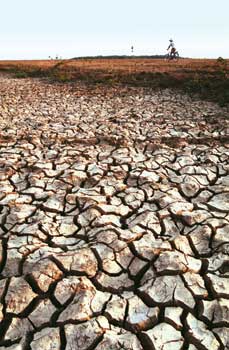
Carlos Silva/Imapress/PAGOSDrought on Marajá Island in 2005: if nothing is done, part of the Amazon Region might become a savannaCarlos Silva/Imapress/PAGOS
The release of two studies on Brazil’s greenhouse gas emissions and the damage to the country’s economy caused by climate change stirred up debate amongst the scientists, environmentalists and authorities in the days immediately preceding the Copenhagen Conference, scheduled to take place from December 7 to 18 in Denmark. One of the studies was led by Carlos Cerri, a professor from the Center for Nuclear Energy in Agriculture, at USP’s Piracicaba. In an article published in the journal Scientia Agricola, the team led by Cerri presented an estimate of the increase in Brazil’s greenhouse gas emission in the last few years. The information achieved a certain repercussion, because the last official assessment of emissions dated back to 1994. The new estimate fueled the debate on Brazil’s ability to contribute to the reduction of global emissions at a time when the Brazilian government undertook to cut, by 2020, 36.1% to 38.9% of the greenhouse gases estimated for that year.
According to the study led by Cerri, with FAPESP funding, Brazil’s emissions rose by 24.6% from 1990 to 2005 and their profile changed. Although deforestation continues to be Brazil’s chief source of greenhouse gas emissions (51.5%), its growth was only 8.1% during this time. As for emissions due to power consumption, crop and livestock farming, industry and waste, they increased by 41% on average. The analyses provided by Cerri’s group were based on other studies. “Universities should focus more on this kind of research”, said Cerri, who has already done similar work for IPCC, the Intergovernmental Panel on Climate Change. His group is now poring over another challenge. It is surveying options to mitigate the effects of climate change and simulate scenarios that might aid decision-making, such as the consequences of the expansion of planted areas for the production of bioethanol and biodiesel to replace fossil fuels, the modernization of ranching by resorting to the confinement of cattle, or changes in the management of soil, with the introduction of direct planting.
Preliminary data
The study’s repercussion and the lack of official data on emissions led Sergio Rezende, the minister of Science and Technology, to divulge in late November the preliminary data from the second Brazilian inventory of carbon emissions, covering the 1990-2000 period, which, however, will only be completed in 2011. According to the minister, emissions increased by 62% from 1990 to 2005. Those of carbon dioxide equivalent (CO2eq) released by the energy sector increased from 15.8% to 16.4%; by industrial processes, from 2% to 1.7%; by agriculture, from 25.4% to 22.1%; from change in the uses of land and forests, from 54.8% to 57.5%; and from waste treatment, from 2% to 2.2%.
Another important study released in late November tried to quantify Brazil’s economic losses if all countries are unsuccessful in the world effort to revert the impact of global changes. Inspired by the Stern report, a British study from 2006 that evaluated the effects of climate change on the world’s economy for the next 50 years, the Climate Economics study sought to forecast the range of losses in Brazil. Economic losses up to 2050 would reach a figure between R$719 billion and R$3.6 trillion, generating a R$534 to R$1,600 reduction in the annual income of each Brazilian citizen. “This is equal to wasting an entire year of growth in the next 40 years”, said Sérgio Margulis, a World Bank economist and the study’s technical coordinator.
To work out their estimates, the researchers measure the likely losses in several economic sectors, such as livestock ranching, which might fall 25% as a result of a water deficit, besides other effects, such as those caused by the rising level of the sea in coastal areas. Two economic growth scenarios for Brazil were simulated: one based on an environmentally sustainable economy and the other based on a “dirty” economy, with rising CO2 emissions.
According to the study, the areas most vulnerable to climate change in Brazil would be the Amazon Region and the Northeast. Warming would lead to a 40% reduction in the forests of the south, southeast and east of the Amazon region, where savannas would arise instead. In the Northeast, the scarcity of rain would lead to agricultural losses in all the states. “A key aspect is the social injustice to be driven by this. The North, Northeast and Midwest would be hit more strongly and we know that the poorest populations are more heavily affected under such circumstances”, said Margulis. All the country’s crops, except for sugarcane, would suffer losses, in particular soy (-34% to -30%), corn (-15%) and coffee (-17% to -18%). The rising sea level would lead to coastal area losses in the order of R$136 billion to R$207.5 billion. Adaptation to the hotter climate would demand that the country install added power generation capacity equal to about 25 to 31% of the 2008 electricity supply, at the cost of US$48 billion to R$51 billion, depending on the scenario.
The overall coordination of this study was conducted by Professor Jacques Marcovitch from the School of Economics, Management and Accounting at the University of São Paulo (FEA/USP). Its technical coordinators were Sérgio Margulis, an economist from the World Bank, and Carolina Dubeux, from the postgraduate program in engineering at the Federal University of Rio de Janeiro (Coppe/UFRJ). The work brought together a group of 11 research institutions: the University of São Paulo (USP), the State University of Campinas (Unicamp), Embrapa, Inpe (the National Space Research Institute) and Fiocruz, among others. “It is already known that Brazil is a country that is progressing when it comes to economic and social issues”, the study’s coordinator, Jacques Marcovitch, stated to the BBC agency. “Now, what it can and must do is to complete these two acknowledgements with a third one. It can become a leader in development policies that include an environmental dimension”.
Republish